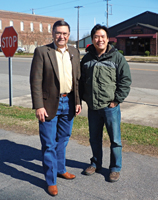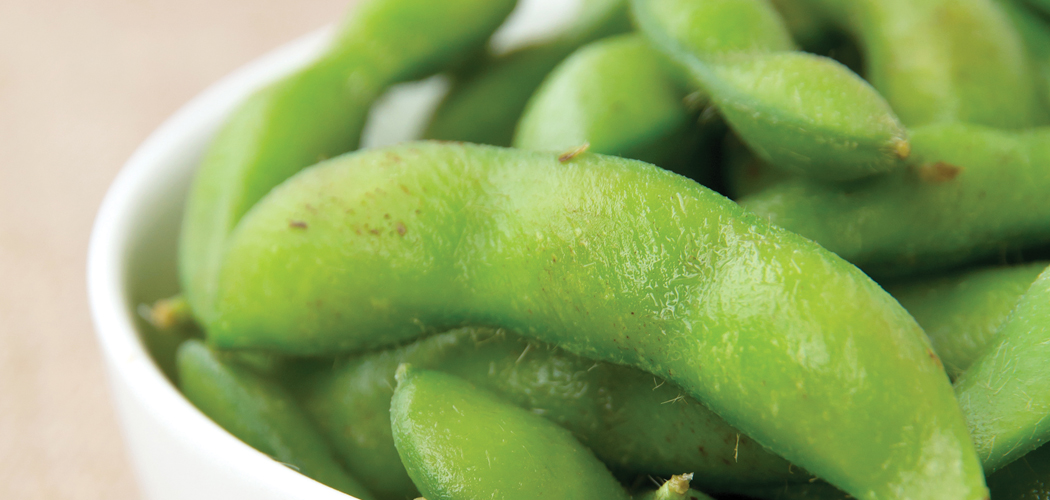[title subtitle=”words: Marcus Coker
image: courtesy City of Mulberry”][/title]
Everyone knows that oranges come from Florida, and apples from Washington. But here’s a question: Where does the vegetable edamame (pronounced e-də-‘mä-mā) come from?
If you said, “Mulberry, Arkansas,” you’re on the right track.
Edamame means “beans on a branch,” and is an immature soybean, which means that it’s picked early. For centuries, it’s been a staple food in Asian countries and was first introduced in the United States in Japanese restaurants as a snack food eaten with Sake or beer. Over the last ten years, it’s grown in popularity in the United States, with Americans consuming 25 to 30 thousand tons of edamame annually. Ninety-eight percent of that total is imported, with ninety-five percent coming from China.
Those numbers, however, don’t account for American Vegetable Soybean & Edamame, Inc. (AVS). AVS is an edamame processing plant that opened in Mulberry in 2012. The plant is unique not only because it’s processing edamame in the United States, but also because it’s the only facility in the United States that’s dedicated solely to edamame.
 AVS is owned and operated by the family of Dr. Gene Chung, who has been in the food business for over thirty years and importing and distributing edamame from other countries since 2004. Aware of consumers’ concerns about food safety issues in China and their desire to bring jobs back to the United States, Gene and his family decided to start growing edamame themselves. Arkansas, which produces 3.2 million acres of soybeans annually, turned out to be the perfect place to do so.
AVS is owned and operated by the family of Dr. Gene Chung, who has been in the food business for over thirty years and importing and distributing edamame from other countries since 2004. Aware of consumers’ concerns about food safety issues in China and their desire to bring jobs back to the United States, Gene and his family decided to start growing edamame themselves. Arkansas, which produces 3.2 million acres of soybeans annually, turned out to be the perfect place to do so.
“We had met a contact in Arkansas who really helped us think about how to do edamame in the United States. After a while, we realized the missing link was having a processing facility,” says Ray Chung, Gene’s son and chief financial officer of AVS. “It’s worked out well, and we’ve been very impressed with the infrastructure and how efficient everything is in the state. Plus, although we don’t have any scientific evidence, we just know our Arkansas edamame tastes better. I suspect it may be because the land in China has been farmed for centuries, so it’s most likely been depleted.”
With Arkansas being the tenth largest producer of soybeans in the country, AVS had an easy time finding growers for edamame. Ray says, “All of our growers have very strict guidelines that we follow, as all of our products are verified as non-genetically modified. Additionally, they are organic, which means only approved chemicals and pesticides are used.”
The venture has been good for AVS, but it’s also been good for Mulberry and its 1,655 residents. When the plant first opened, the city hosted a job fair for those interested in employment at AVS. Initially the company hired forty employees, but currently has about a hundred. “We only expected twenty-five people to show up, but they were lined up down the street. There were 150 applicants that day,” says Mayor Gary Baxter.
“The AVS facility cost 11 million dollars, and that brings a lot of value to the community,” says Mayor Baxter. “When the company first approached us, there was talk about tax breaks for them to come to Mulberry. But the owners said, ‘We’re not even going to go there. We want to pay the taxes to support the community and the schools.’ So there are the jobs and the property taxes, but there are also a lot of peripheral benefits, like the products bought locally used in construction and the fuel and water used on a regular basis. It’s all very positive.”
The edamame that AVS produces is planted in spring and harvested in summer at the peak of ripening, before hardening time. First, the pods are washed by machine and “de-haired.” Then they are cooked with hot water (194 to 203 degrees Fahrenheit) for 80 to 100 seconds and sent to a blast freezer for quick freezing. This process is called blanching. Ray says, “It has to be processed quickly because soybeans have an enzyme that will break down the product and cause it to spoil. With every hour that passes, the sweetness decreases if you don’t blanch it.”
The final step is that the edamame is packaged for consumption. “Our Imperial brand product, which is simply packaged edamame, is sold at Sam’s Club and comes from our Arkansas crop. AVS also packages our other product, Cruncha Ma-Me, and we’re making the switch so that it will come from our Arkansas crop as well,” says Ray.
“Cruncha Ma-Me is a snack we make with fresh edamame that’s been freeze-dried. (Freeze-drying involves a vacuum chamber that causes water to flash straight into a vapor.) Most snacks are baked or fried or roasted, and the high temperatures kill the nutrients. Freeze-drying, on the other hand, is a good way of preserving nutrients and flavor. Think about food for astronauts. It’s great for kids because it’s tasty, high in protein, and more portable than regular edamame. It comes in a variety of flavors and can be purchased through Amazon.com.”
Edamame can be eaten by itself as a finger food, but it can also be used as an ingredient for soups, salads, or vegetable dishes. Similar to large green beans, edamame beans come in a pod, which can be snapped open to remove the beans for eating. Most people add salt to the beans, and AVS packages their products with sea salt packets for those who wish to use them.
The beans are about forty percent protein, high in fiber, and low in fat. They have about 189 calories per cup. “I’d never eaten edamame until I heard that AVS was interested in coming to Mulberry,” says Mayor Baxter. “Then I tried it as an appetizer at a restaurant and really liked it. We’ve started calling Mulberry the edamame capital of the United States.”
With AVS planning to expand its already 33,000 square foot facility by fifty percent, Arkansas is quickly on its way to becoming a top edamame producer. As consumers, we benefit from a great-tasting product that’s good for us and is practically grown in our own backyards. Ray says, “More and more people are becoming concerned about where their food is coming from. Traditionally, we’ve had a very industrial food supply chain where people didn’t know where their food was coming from. But people are starting to understand the different issues like genetic modification that arise from that chain. It’s really important to many parents with young kids. Plus, we’re bringing jobs back to the United States, and I love that we can support the community and provide jobs to local residents.”
It’s no small thing – providing a healthy, organic product that’s made in the United States. And just as the individual benefits, so does the community of Mulberry and the state. Because just like Florida has oranges, and Idaho has potatoes, Arkansas now has edamame, and that’s something not only to eat, but also to be proud of.
[separator type=”thin”]
On Saturday, March 29, 2014, the City of Mulberry and AVS will be hosting the First Annual Edamame Festival at the Mulberry City Park. The event is free to attend and will last from 10 AM to 5 PM, rain or shine.
The festival will include a variety of vendors, a bounce-around, an antique car show, live music by Bill Rogers and others, a pageant for young children, a three-on-three basketball tournament, a disc golf tournament, and helicopter rides.
AVS will provide edamame and Cruncha Ma-Me for sampling, as well as other delights like edamame salsa and edamame guacamole.
Mulberry City Park
419 Mulberry Highway 64 West
Mulberry, Arkansas 72947
For more information, including information for new vendors, check out Mulberry City Limits on Facebook, or contact the mayor’s office at 479.997.1321 or mayor@cityofmulberry.org.




